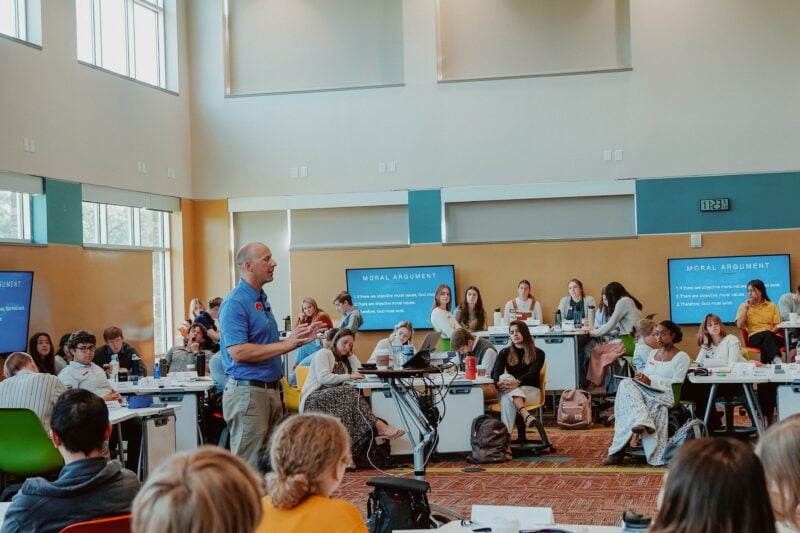Check out this article from Barna, showcasing the research done in partnership with Impact 360 Institute.
With three major volumes of research on Gen Z and other related studies, we are gaining a clearer and more vibrant portrait of who Gen Z are and how they uniquely contribute to our collective society, their communities and their faith.
Now, once again in partnership with Impact 360 institute, Barna Group has added to its years-long research of this generation with a brand new report: Gen Z Volume 3. Filled with fresh data and insights, this study uncovers how today’s teens and young adults navigate identity, morality, technology and faith.
For leaders, pastors and parents who are in close proximity to Gen Z, here are the five things you need to know about this generation:
- Gen Z Feel Held Back From Fully Being Themselves
Authenticity is an important feature of Gen Z’s self-identification journey. The insecurity and uncertainty of the coming-of-age years, however, can challenge the much-discussed Gen Z persona of being authentic, bold, expressive and accepting. Gen Z in early adulthood (for our study, this is ages 18–24) are nearly twice as likely as Gen Z teens (ages 13–17) to say they have felt held back from being able to authentically express who they are (62% vs. 34%). Female Gen Z are significantly more likely than their male peers to say they have felt held back from authentically expressing themselves (53% vs. 47%). Female Gen Z young adults are the most likely segment to feel “held back” (67%). - Gen Z Prioritize Happiness, Stability & Good Health
When asked about life goals, only 7 percent of Gen Z respondents indicate that they want to prioritize being in a lasting community, making this the least selected goal in the list. About one-quarter aims to stay near their family (27%), get married (29%) or have children (26%). These relational aspirations are not nearly as frequently selected as things like being happy (65%), being financially stable (53%), having good physical health (48%), having good mental and emotional health (49%) and loving and being confident in themselves (46%). These self-optimizing goals seem fitting to the generation coming of age during an era that has also seen the mainstreaming of destigmatized therapy, self-care methods and personal affirmations. - Gen Z Are Online, But They Still Value In-Person Connection
Gen Z perform a balancing act between connections made online and those cultivated in person. While many recognize the value of in-person relationships, it does not undermine their desire to stay digitally connected. Over half of Gen Z strongly agree that in-person relationships are more valuable than digital relationships (54%), and another three in 10 (30%) somewhat agree. Even though so many Gen Z spend time on social media sites and engaging with others online, over three in five strongly (27%) or somewhat agree (41%) “I wish I spent less time online.” This doesn’t mean Gen Z are not leaning into online community. Seven in 10 either strongly (29%) or somewhat (41%) agree that they have built a community of friends through online experiences. - For Gen Z, Morality Is Often Subjective
For the most part, Gen Z strongly agree what is morally right or wrong can change over time based on society. But there has been a significant jump in the number who disagree with this statement, from 20 percent to 27 percent, since 2016. There are some things Gen Z say can and should be “backed up.” Two in three (66%) agree that they need evidence to support their beliefs. Yet, even with this reported emphasis on factual support, there are some areas where Gen Z prioritize an individuals’ beliefs over absolute truths. Nearly three in five Gen Z (57%) agree there are facts we can know about scientific questions, but not religious or moral questions. Gen Z are much more willing to believe what is morally right or wrong depends on what an individual believes (60%). - Most Gen Z Say They’ve Prayed in the Past Week
Regardless of their religious beliefs, Gen Z today are participating in various faith practices and may be open to exploring spiritual traditions to some degree, even if they don’t necessarily identify with a particular religion. Illustrating this theme, the prayer lives of Gen Z stand out. Among all Gen Z, nearly two in three (64%) report having prayed to God within the last seven days. This is well beyond the percentage who regularly engage in other spiritual routines Barna asked about. Just under two in five say that in the last week they read from the Bible (37%) or attended a church service (36%). One in three Gen Z (33%) also claim they “read from a book on a topic that helps me grow in my Christian faith” in the last week.
